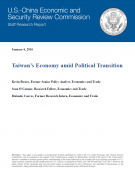
Leading up to the 2016 election, Taiwan’s electorate has grown largely dissatisfied with the state of the domestic economy and increasingly worried about Taiwan’s growing dependence on China. Amid stagnant growth and wages, the Democratic Progressive Party (DPP) has focused its campaign on improving Taiwan’s domestic economy through expanded social welfare benefits, a higher minimum wage, and new local sources of innovation. Meanwhile, the economic platform of the Chinese Nationalist Party (Kuomintang, or KMT) has largely been defined by promoting Taiwan’s external economic relations, especially with China, as a means of supporting export-led growth. This report provides an objective review of major economic indicators in Taiwan, and evaluates the implications of political transition for Taiwan’s economic relations with China, the United States, and the international community.
